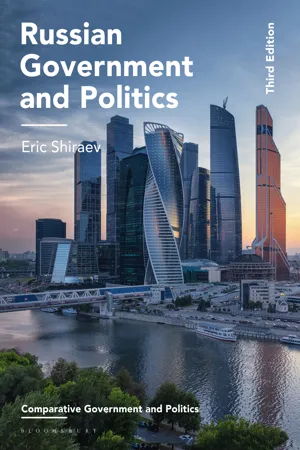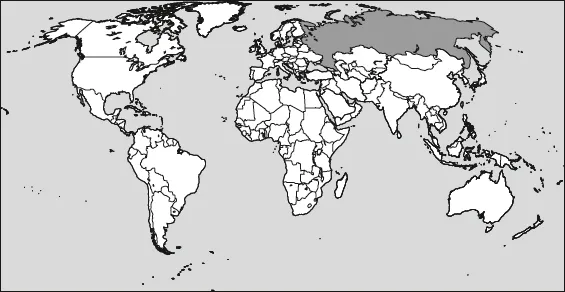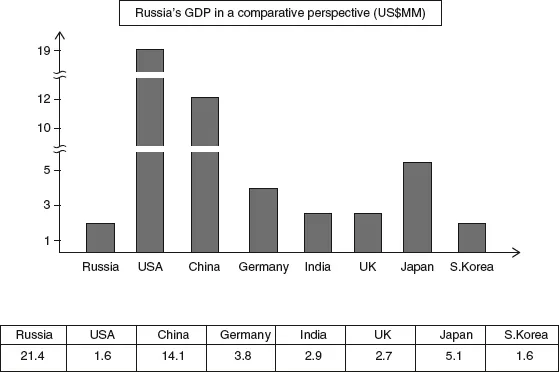![]()
Part I
Russia: Continuity and Change
Why do we study Russia? What makes this country important, and in some ways distinct, in a global world today? Who are Russians as a people, and how has Russia developed as a state? In Part I of the book we will describe Russia as a country, briefly review its government and policies, and then turn to its rich history. We will first review the development of the Russian state from its foundations to the end of the Russian Empire in 1917. Then we will learn about the Soviet Union, the first sovereign state in the world that was built on the communist ideology. After that, we will study the reasons why the Soviet Union imploded and how this affected the process of difficult social, political, and economic transitions that followed.
![]()
1 Studying Russian Government and Politics
Russia, officially known as the Russian Federation, is a major global power with vast natural resources, a strong military, a large nuclear arsenal, an educated population, and significant economic capacity. A country with a rich history and traditions, Russia is now defining its role and status in the 21st-century world. Its journey to this point, to the country’s potential prosperity and stability, has so far been difficult and contradictory.
WHY WE STUDY RUSSIA
Today, Russia no longer has food shortages, but the country’s economic inequality is staggering. The roads are paved in big cities where supermarkets are plenty, but the countryside is struggling. Russia seeks international peace and global stability, yet its government constantly perpetuates in its people a belief in growing foreign threats against it. Russian people enjoy some political freedom, but in many areas, their civil liberties are seriously limited. Russia embraces democracy in some areas of life yet has increasingly turned to authoritarianism in others.
Russia today is a constant newsmaker. Many strategic decisions taken by its leaders domestically and internationally may appear perplexing to an average observer. However—and this is one of many reasons why we study Russia—behind Russia’s policies, there is a complex strategy based on a comprehensive yet contradictory vision of today’s world. Russia’s actions during the first two decades of the 21st century have caused serious concerns in many countries, especially in the West. What are Russia’s strategic long-term goals? What does Russia want as an international player? Is Russia a partner or a foe to the West? Do people—in the United States, Canada, the United Kingdom, Japan, Germany, and elsewhere—have to embrace Russia and its policies? Is cooperation with Russia a better alternative than confrontation? These questions need serious and informed answers.
Russian leaders can immediately change some elements of their country’s complex strategy, but the most essential ones are likely to remain the same for some time. For any person who studies politics and international relations, for a future diplomat, journalist, entrepreneur, educator, officer, analyst, or policymaker, it is essential to learn about, understand, and correctly interpret Russia’s strategies and specific policies based on the country’s previous actions. Therefore, we need to better learn about Russia’s rich history, better assess its current potentials and weaknesses, and better analyze the motivations of its leaders.
Today and for the past three decades, Russia has presented itself as a fascinating case of democratic transition and seemingly difficult and unsuccessful experiments with liberal values and transparent governance. The country’s ineffective embracing of democracy serves as a teachable moment in history. It poses many questions, including the difficult ones, such as, “Are some countries like Russia simply not ready for democracy? Or, are we maybe too quick to judge Russia’s experiences?” Russia’s historic experiences and today’s practices are also very important in our studies of federalism and its opportunities and limitations in a multiethnic state. The country’s federal model is vital for our understanding of national identity and nationalism, especially in today’s world when more governments are turning to populism to set their domestic and foreign policies. Russia’s experiments with the free market and capitalism can help us to learn more about the nature of the sources of countries’ economic growth and the role of natural resources, as well as about inequality and injustice.
In the light of the many problems that have surfaced in the past 20 years in the relations between Russia and the West, several important tasks for foreign policy, defense, and security decision makers in the West will likely remain. Among them will be monitoring Russia’s international actions; assessing Russia’s economic capabilities and its global energy policies; assessing Russia’s military capabilities; and checking Russia’s ambitions and actions in various regions. It will also be important to seek means of productive cooperation in several key areas, including conflict resolution, nuclear security, and counterterrorism.
Our understanding of the political, social, and economic developments in Russia and our study of Russian domestic and foreign policies should help in developing effective bilateral relations between Russia and other countries, including, but not limited to, the United States, Canada, the United Kingdom, China, South Korea, Brazil, and India, and with the European Union. Knowing more about better forecasting Russian policies should also facilitate the effectiveness of many international organizations and nongovernment groups. This should help, hopefully, in preserving and building a more secure, stable, and prosperous world (Box 1.1) (Map 1.1).
Box 1.1 The importance of definitions
In the English language, the word “Russian” refers to something or somebody associated with Russia. However, if you translate this word into the Russian language, you have to be careful, because there are two different meanings for this term. One refers to “Russian” as an ethnic category (“Roos-ski”). The other (“Rossiy-ski”) refers to something or somebody belonging to or associated with the Russian Federation as a sovereign state; this is a civic not ethnic category. Both these adjectives are translated into English as “Russian,” which may create confusion. Some people from various ethnic groups living in Russia may be sensitive to the way you apply the term “Russian” to them. They might have been born and raised in Russia and retain Russian citizenship, but not be ethnically Russians (Sakwa, 1993: 116). If you speak Russian, you can avoid this confusion by using the right adjective. In English, you have to provide additional explanations of the word “Russian” as referring to either an ethnic group or citizenship.
What makes this country important, and in some ways distinct, in today’s global world? What can we expect from Russia in the immediate as well as the distant future? This book should provide some answers to these and many other questions. For starters, as a preview of Russia as a country, consider a few facts and opinions.
RUSSIA AS A COUNTRY
Location, size, and geopolitics
The Russian Federation stretches over 6.5 million square miles, which is more than 17 million square kilometers (Russia, like most countries in the world, uses the metric system). It is almost twice the size of the United States, Canada, or China. Russian territories stretch from Central Europe to the Sea of Japan. Russia covers ten time zones extending across Eurasia. When you arrive at midday in Kaliningrad, Russia’s most western seaport in Europe, it is 1 p.m. in Moscow, Russia’s capital, and already 10 p.m. in Petropavlovsk, a city on the Kamchatka Peninsula in Russia’s Far East. Russia borders the Baltic Sea in the west, the Black and the Caspian Seas in the south, the Arctic Ocean in the north, and the Pacific Ocean in the east. Russia shares borders with five NATO countries (Norway, Estonia, Latvia, Lithuania, and Poland), faces a sixth (Turkey) across the Black Sea, and is separated only by the 53-mile-wide Bering Strait from the United States. Overall, Russia borders 16 internationally recognized member states of the United Nations. Russia is among the top ten most populous countries in the world. Its 143 million citizens live on one eighth of the planet’s inhabitable area.
Any country’s location and size are important factors determining its politics and position in the world. For centuries, sovereign states used geopolitics—the theory and practice of using geography and territorial gains to achieve political power or seek security. Geographical position gave some countries clear benefits in security matters, while others remained vulnerable. The facts of Russia’s size and location are important geopolitical factors affecting its domestic and foreign policy: anything that happens adjacent to Russia Eurasian territories can appear critical to Russia and cause it to react. Whether or not Russia can be considered to be a global power is debatable. Meanwhile, Russia is actively engaged in international affairs. It participates in several UN peacekeeping operations in various parts of the world. Russia remains very active in the Middle East and Africa. Russia has been actively reaching out to several Asian and Latin American countries.
Regional power
Russia remains a key regional power. Located in Eurasia, it pursues its own political, economic, and security interests around the perimeter of its borders. These pursuits do not often correspond with the strategic interests of the United States, Japan, the United Kingdom, or many other countries. For example, despite Russia’s unenthusiastic view of North Korea’s military preparations, Russia continued to maintain economic, political, and cultural ties with the communist government of that country. For many years, Russia also maintained friendly relations with the government of Iran, despite this country’s apparent nuclear ambitions and anti-Americanism. Although the Soviet Union as a state no longer exists, Russia, as the biggest and strongest country of the former Soviet Union for years, continued to claim its own “privileged interests” in the so-called post-Soviet territories (Medvedev, 2009; Putin, 2012b). Russia has been engaged in at least two military conflicts with its sovereign neighbors (Georgia in 2008 and Ukraine in 2014) and annexed a territory of Ukraine. All these and other facts point to Russia’s essential regional role.
Military power
Russia remains a very strong military state with immense nuclear capabilities. Having strong military capacities has always been the highest priority of Russian leaders in the past (Pipes, 1984). Russia began to produce nuclear weapons in 1949 and had reached nuclear parity with the United States by the 1970s. In the first decade of the 21st century, Russia maintained a nuclear arsenal and delivery systems generally comparable to the arsenal of the United States (Legvold, 2009). In the past ten years or so, Russia has taken important steps to modernize its military capabilities. Russia constantly develops new conventional and nuclear weapons and military technologies including strategic bombers and ballistic and supersonic missiles. Russia’s military expenditure grew between 2011 and 2015 but remained relatively unchanged in the following years. Although Russia remains behind the United States and China in terms of its military budget, it has already surpassed countries such as France and the United Kingdom (Chatham House, 2018).
Economic and energy power
Russia is an economically developed country. The country’s gross domestic product (GDP, or the value of all goods and services produced over a specific period), is one of the world’s twenty largest. Russia’s economy, relative to its size, lags behind those of the United States, China, the European Union, Canada, and India, among a few others. It is ahead of South Korea, Mexico, and Spain. Russia has a functional economy with both private and state control of major industries (IMF, 2020) (see Figure 1.1). Russia entered the 1990s as a decayed, centralized, yet disorganized economy, which was transformed within ten years (Shleifer and Treisman, 2004). Russian exports (mostly oil and gas) and fiscal austerity generated steady economic growth in the early 2000s (McFaul and Stoner-Weiss, 2008). Russia’s management of its economy, based on free-market principles coupled with government regulation of key industries, worked well during the period of very high prices for energy resources, as Russian leaders have acknowledged themselves (Putin, 2012d). In addition, capital gains and personal income taxes remained low in order to attract foreign investments. By the early 2010s, Russia had achieved financial stability and a budget surplus. Inflation remained modest, and the Russian economy grew at a steady pace of around 6 to 7 percent annually. Wages, on average, went up 350 percent, compared with the late 1990s (Strategy, 2020). For most Russians, living standards in the second decade of this century have been higher than at any time in Russian history (Chatham House, 2018). However, a series of global developments (Chapter 10) and falling oil prices, as well as mistakes in economic policies (Chapter 13) contributed to Russia’s slower economic growth and economic stagnation in the late 2010s. Many foreign investors pulled out of the country’s markets.
Russia has nearly 22 percent of the total forested land in the world, a zone larger than the entire continental USA (Greenpeace, 2012). In the 21st century, Russia also became one of the biggest world energy suppliers. It has vast reserves of natural gas and oil on its territory, which could be available for exploration and extraction in 10 or 15 years (if this becomes necessary). In addition, Russia is near to Arctic gas and oil reserves, a large, unexplored source of hydrocarbons. Moscow claims that these energy resources must belong to Russia. Other countries disagree. This could cause serious legal disputes and even tensions in the future, especially if hyperhydrates remain a major source of energy in the future. Because of its size and economic infrastructure, Russia is one of the biggest contributors to greenhouse gases, and stands behind only the United States, China, and the European Union as a global polluter. Russia is generally aware of these facts as well as its role as an important dec...


